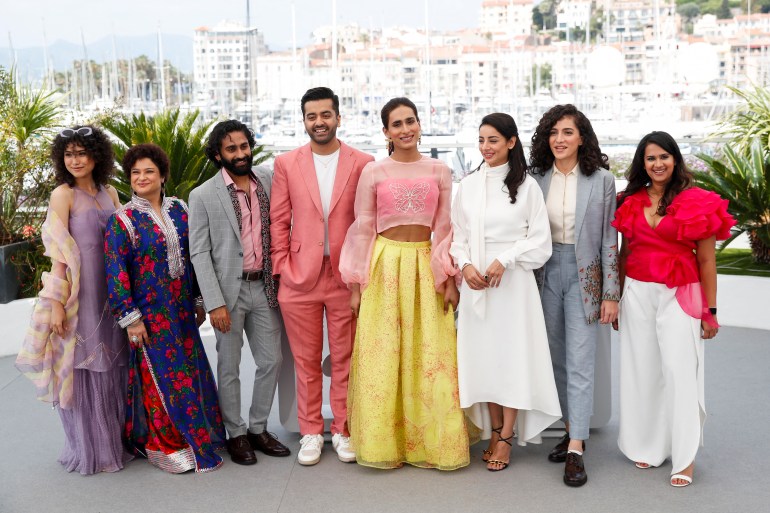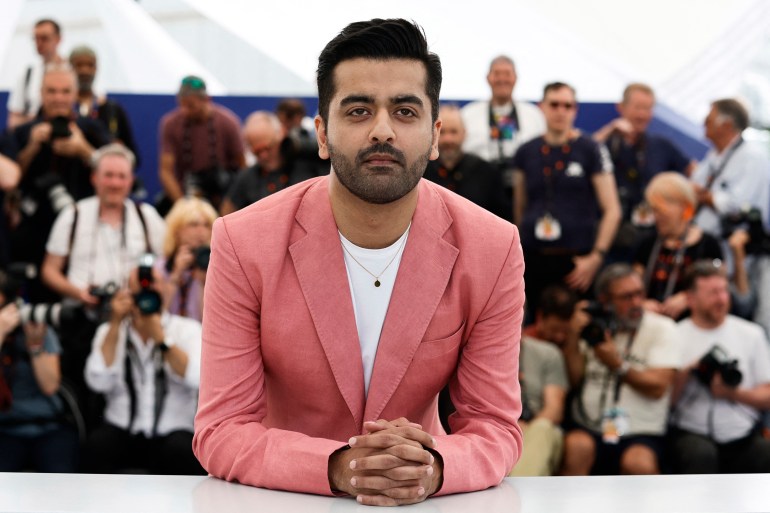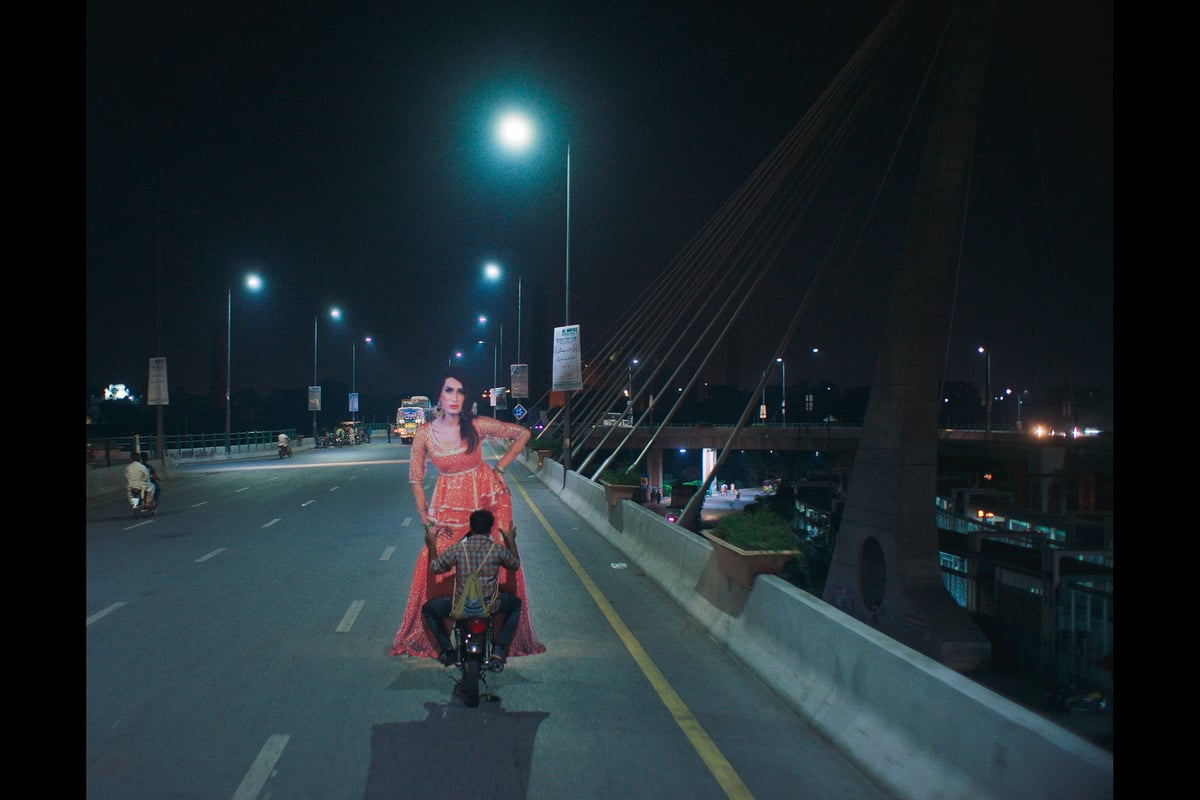Joyland: Taboo-tackling Pakistani film makes history at Cannes
Director Saim Sadiq talks to Al Jazeera about his film Joyland, the first ever Pakistani entry at the Cannes Film Festival.
View attachment 849195
Director Saim Sadiq, cast member Alina Khan and producer Apoorva Guru Charan pose in Cannes [Sarah Meyssonnier/Reuters]
By Suparna Sharma
Published On 27 May 202227 May 2022
Cannes, France – Pakistani writer-director Saim Sadiq says he just kept sobbing as the premiere of his debut film, Joyland, at the
Cannes International Film Festival on Tuesday received a lengthy standing ovation.
Amid all the emotion, he was not sure how long the clapping lasted.
“Somebody told me 10 minutes, somebody told me seven. I don’t know what to believe. I know that I had enough time to hug my whole team of 40 people twice,” Sadiq told Al Jazeera.
Standing ovations are a tradition at Cannes, and each minute is a measure of the audience’s love for a film. Debut films by young directors are always special, and Joyland even more so because it is the first Pakistani film to be selected as an official entry at the world’s most prestigious film festival, which ends on Saturday.
Joyland is up for two awards at the festival, including Un Certain Regard – “a certain glance” – which celebrates emerging directors and films on marginal themes.
Joyland, which tackles gender and sexuality issues that are
taboo in Pakistan, stars a transgender actress, Alina Khan, as the lead.
“Joyland is sheer joy for Pakistan … There are very few moments in Pakistan’s cinematic history that we can all be proud of. I know that in 2012, when I brought the country’s first Academy Award home, the nation united in its understanding that we too can be champions of cinema,” Sharmeen Obaid-Chinoy, Pakistani filmmaker and two-time Oscar winner in the best documentary short category, told Al Jazeera over the phone.
“And I think Tuesday in Cannes was another such moment for Pakistan.”
Director Saim Sadiq, cast members Alina Khan, Ali Junejo, Sarwat Gilani, Sania Saeed, Rasti Farooq and producers Apoorva Guru Charan and Sana Jafri pose in Cannes [Stephane Mahe/Reuters]
Pakistani cinema – which has been affected for decades by political intervention, religious commandments and bureaucratic apathy – finally having its glorious moment on the world stage was “magical”, says Sarwat Gilani, a well known Pakistani actress who stars in Joyland.
She said that the hugs and tears that flowed at the premiere during the extended ovation were not just an expression of joy, but also an acknowledgement of the struggles artists face in Pakistan.
“In our wildest dreams we could not have thought [we would be] here and represent Pakistan with a debut film,” she said.
Joyland’s journey
Set in Lahore, Joyland tells the fictional tale of a middle-class family where a wheelchair-bound ageing but stern patriarch controls the lives of his two sons and daughters-in-law. He wants his sons to give him grandsons, but everything changes when his younger son, Haider, becomes a background dancer for a transgender dancer, Biba, played by Alina Khan, and they fall in love.
Speaking with Al Jazeera a day after his film’s preview at Cannes, Sadiq, 31, said he was still processing it all and had yet to call his parents.
He said he has long been interested in themes of “patriarchy, gender constructs and the idea of identity”. Joyland’s story was an idea that he worked on while doing his masters in fine arts at New York’s Columbia University.
That resulted in a short film, Darling. Starring Alina Khan as a struggling transgender dancer, it won the Orizzonti Award for Best Short Film at the Venice Film Festival in 2019.
Sadiq jokes that “one makes shorts only because one can’t make a feature”, and adds that a full-length feature film was always his goal.
Joyland’s story was an idea that Sadiq worked on while doing his masters in fine arts at New York’s Columbia University [Sarah Meyssonnier/Reuters]
Los Angeles-based Apoorva Charan, Sadiq’s friend from their days at Columbia University, and now one of Joyland’s producers, says funding was not easy to come by – although they eventually secured most of the funding from United States backers.
“I think the challenges were: first-time feature director, first-time feature producer, non-English language film with a Pakistan focus,” she told Al Jazeera.
Sadiq says Joyland’s journey has been long, but the film is “blessed”.
As well as being in the running for the Un Certain Regard prize, Joyland is also a contender for Caméra d’Or (Golden Camera), an award given to a first-time director. The results will be announced on Friday night.
If Sadiq is nervous, he does not show it.
“Whatever happens is just icing on the cake. We have a cake already,” Sadiq said with a smile.
1,007 likes, 14 comments - dawn_images on May 24, 2022: "Joyland gets a standing ovation at Cannes! 🤩 (via @iamsunilshanker )".

www.instagram.com
Against the odds
Obaid-Chinoy, who was on her way to the US for the launch of the Ms Marvel series that she has co-directed, said Pakistani filmmakers have the odds stacked against them.
“To make a film in Pakistan is to make a film on your sheer perseverance and stubbornness because the infrastructure and the ecosystem does not support cinema in this country,” she said.
Apart from funding and infrastructure, what is also lacking in Pakistan is a cinematic lineage that young filmmakers can learn from.
“Like almost every Pakistani kid,” Sadiq says he too grew up on Bollywood films, and it was only in his late teens that he discovered world cinema. He counts Iranian filmmaker Ashgar Farhadi, American director Paul Thomas Anderson, and Krzysztof Kieslowski’s Three Colours trilogy among strong influences.
“I had a relationship with almost every country’s cinema except my own because, when I was a teenager, there was no [Pakistani] cinema,” he says.
While documentaries from Pakistan on subjects such as women, honour killings, acid victims and terrorism have been celebrated at international film festivals, and at home television soaps have a massive audience, Urdu commercial cinema has long struggled.
Every few years a film emerges that draws the audiences back to cinema halls,
rekindling hope that more films will follow. In 2007, it was Shoaib Mansoor’s Khuda Kay Liye. In 2011, it was again Mansoor’s Bol. In 2013, it was Farjad Nabi and Meenu Gaur’s Zinda Bhaag, which also became Pakistan’s first Oscar entry after a gap of 50 years.
However, the energy is never sustained and in Pakistan’s Urdu-speaking middle class there is little culture of going to the cinemas with family and friends. And for cinema owners, banking on Pakistani films is not smart business.
A law in Pakistan stipulates that cinema owners must give precedence to, and more than 80 percent of the screens, to Pakistani films over foreign films.
But earlier this month some filmmakers in Pakistan held a press conference to complain that cinemas were not giving screens for their new films that were released during the Eid weekend, preferring instead the Marvel Studio’s money-spinner, Doctor Strange in the Multiverse of Madness.
Both Gilani and Obaid-Chinoy say that Joyland and its success at Cannes could change that – especially as a new generation of Pakistani filmmakers have studied or spent time abroad and been exposed to the possibilities that lie beyond Pakistan and the Indian subcontinent.
“To have a Pakistani film for the first time premiere at Cannes – a story that is germane to Pakistan, that is produced by Pakistanis, where the major cast and the crew come from this country, really shows the strides that this generation of filmmakers have made,” Obaid-Chinoy said. “I think that Saim’s film at Cannes is going to open the floodgates for many filmmakers who will now realise the possibility of creating films that can shine on the international stage.”
Joyland has already been acquired for a theatrical release in France, but releasing the film in Pakistan may be a challenge. Gilani, who starred in a 2020 feminist detective web series, Churails (Witches), that was banned in Pakistan, anticipates challenges, criticism and several cuts by censors if the film gets permission for a theatrical release.
But Sadiq is hopeful. Recalling how he and his team wept on Tuesday, way past the standing ovation, he said: “Everything felt more emotional, because it felt like the start of something.”
Director Saim Sadiq talks to Al Jazeera about his film Joyland, the first ever Pakistani entry at Cannes Film Festival.

www.aljazeera.com
View attachment 849197
Saim Sadiq's 'JOYLAND' debuts with a perfect 100% score on Rotten Tomatoes.
Discover reviews, ratings, and trailers for Joyland (2022) on Rotten Tomatoes. Stay updated with critic and audience scores today!

www.rottentomatoes.com
'Joyland' Review: Pushing the envelope
Joyland marks a strong debut, not just for its director Saim Sadiq but for Pakistani cinema at large at the Cannes Film Festival
View attachment 849198
Joyland marks a strong debut, not just for its director Saim Sadiq but for Pakistani cinema at large at the Cannes Film Festival

www.nationalheraldindia.com















